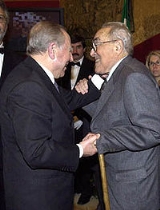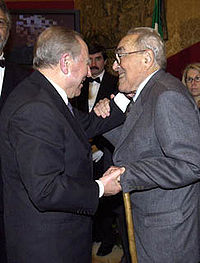
Vittorio Foa
Encyclopedia

Biography
Foa was born in TurinTurin
Turin is a city and major business and cultural centre in northern Italy, capital of the Piedmont region, located mainly on the left bank of the Po River and surrounded by the Alpine arch. The population of the city proper is 909,193 while the population of the urban area is estimated by Eurostat...
in 1910 into a middle-class Jewish family.
In 1931, Foa graduated in Law at the University of Turin and worked in a bank. In 1933, he joined Giustizia e Libertà
Giustizia e Libertà
Giustizia e Libertà was an Italian anti-fascist organization, active from 1929 to 1945.- Italian anti-fascist organization :The anti-fascist organization Giustizia e Libertà was founded in Paris in 1929 by the Italian refugees Carlo Rosselli, Emilio Lussu, Alberto Tarchiani, and Ernesto Rossi...
, an anti-fascist political movement. He was arrested by the OVRA
OVRA
The Organizzazione per la Vigilanza e la Repressione dell'Antifascismo was the secret police of the Kingdom of Italy, founded in 1927 under the regime of Fascist dictator Benito Mussolini and during the reign of King Victor Emmanuel III. The German Gestapo were the equivalent of the OVRA...
in May 1935 and was condemned to 15 years in prison. He shared his cell with Ernesto Rossi
Ernesto Rossi
Ernesto Rossi was an Italian politician, journalist and anti-fascist activist. His ideas contributed to the Partito d'Azione, and subsequently the Partito Radicaleco-authur of the Ventotene Manifesto. Rossi was born in Caserta....
, Massimo Mila and Riccardo Bauer.
Foa was released in August 1943. He joined the resistance movement and entered the Partito d’Azione (Action Party, PdA). As a PdA member, he joined the Comitato di Liberazione Nazionale (National Liberation Committee, CLN)
On 2 June 1946, Foa was elected member of the Constituent Assembly
Constituent assembly
A constituent assembly is a body composed for the purpose of drafting or adopting a constitution...
and he became a member of the Commission of the Seventy. Foa’s name is linked to articles 39 and 40 of the Constitution
Constitution of Italy
The Constitution of the Italian Republic was enacted by the Constituent Assembly on 22 December 1947, with 453 votes in favour and 62 against. The text, which has since been amended 13 times, was promulgated in the extraordinary edition of Gazzetta Ufficiale No. 298 on 27 December 1947...
dealing with the freedom of trade union organisation.
When the Partito d’Azione dissolved in 1947, Foa joined the Partito Socialista Italiano (Italian Socialist Party, PSI) and was elected an MP in 1953 (and again in 1958 and 1963). In 1957, he joined the left-wing trade union of Giuseppe Di Vittorio
Giuseppe Di Vittorio
Giuseppe Di Vittorio, also known under the pseudonym Nicoletti , was an Italian syndicalist trade unionist and communist politician, one of the most influential leaders of the labor movement after World War I....
, the CGIL, and became an influential and highly charismatic trade union leader.
A leading intellectual of the Italian non-Communist left, Foa supported the theory of the political autonomy of the working class, which would later inspire the foundation of extra-parliamentary leftist groups (PSIUP, PdUP, DP).
At the end of the 1970s, Foa left the trade union and active political life to devote himself to historical research and publishing. He taught Modern History at the Universities of Modena and Turin and researched the history of the working class and of the trade unions. Publications of this period include La Gerusalemme rimandata: Domande di oggi agli inglesi del primo Novecento (1985), a study of English working class movements at the beginning of the twentieth century.
In the late 1980s, Foa played an active part in the re-thinking of the Italian left and took a keen interest in the debates within the Italian Communist Party
Italian Communist Party
The Italian Communist Party was a communist political party in Italy.The PCI was founded as Communist Party of Italy on 21 January 1921 in Livorno, by seceding from the Italian Socialist Party . Amadeo Bordiga and Antonio Gramsci led the split. Outlawed during the Fascist regime, the party played...
. In 1987 he was elected Senator from the PCI’s list of candidates.
In 1992, Foa retired, dividing his time between Rome and Formia. One of his last public appearances took place in 2002, when Foa joined the “Manifestazione dei Girotondi”, a spontaneous civil movement that developed in 2002-2003 in several Italian towns.
Defined as “the critical voice of the Italian left”, Foa devoted his life to Italian and European politics in their widest sense, and constantly expressed his confidence in the young. From the role of the trade unions, to the place of science in our contemporary society, Foa’s interests embraced crucial aspects of modern life and society.
On 21 October 2008, Italian newspapers were filled with tributes to Foa. In La Repubblica
La Repubblica
la Repubblica is an Italian daily general-interest newspaper. Founded in 1976 in Rome by the journalist Eugenio Scalfari, as of 2008 is the second largest circulation newspaper, behind the Corriere della Sera.-Foundation:...
, the journalist Miriam Mafai recalled his impatience when asked what the beleaguered Italian left should do. “It’s a waste of time and sense to try to define a leftist identity” – Mafai recalled Foa saying – “You have to do what is right and necessary for the country. It is up to posterity to decide whether it came from the right or the left.”

